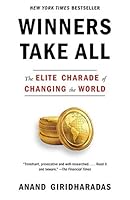
## Metadata
- Author: [[Anand Giridharadas]]
- Full Title: Winners Take All
- Category: #books
## Highlights
- American scientists make the most important discoveries in medicine and genetics and publish more biomedical research than those of any other country—but the average American’s health remains worse and slower-improving than that of peers in other rich countries, and in certain years life expectancy actually declines. American inventors create astonishing new ways to learn thanks to the power of video and the Internet, many of them free of charge—but the average twelfth grader tests more poorly in reading today than in 1992. The country has had a “culinary renaissance,” as one publication puts it, one farmers’ market and Whole Foods at a time—but it has failed to improve the nutrition of most people, with the incidence of obesity and related conditions rising over time. The tools for becoming an entrepreneur appear to be more accessible than ever, for the student who learns coding online or the Uber driver—but the share of young people who own a business has fallen by two-thirds since the 1980s. America has birthed a wildly successful online book superstore called Amazon, and another company, Google, has scanned more than twenty-five million books for public use—but illiteracy has remained stubbornly in place and the fraction of Americans who read at least one work of literature a year has dropped by almost a quarter in recent decades. The government has more data at its disposal and more ways of talking and listening to citizens—but only one-quarter as many people find it trustworthy as did in the tempestuous 1960s. ([Location 70](https://readwise.io/to_kindle?action=open&asin=B077WZRBV2&location=70))
- the average pretax income of the top tenth of Americans has doubled since 1980, that of the top 1 percent has more than tripled, and that of the top 0.001 percent has risen more than sevenfold—even as the average pretax income of the bottom half of Americans has stayed almost precisely the same. These familiar figures amount to three and a half decades’ worth of wondrous, head-spinning change with zero impact on the average pay of 117 million Americans. ([Location 83](https://readwise.io/to_kindle?action=open&asin=B077WZRBV2&location=83))
- we should also recall Oscar Wilde’s words about such elite helpfulness being “not a solution” but “an aggravation of the difficulty.” More than a century ago, in an age of churn like our own, he wrote, “Just as the worst slave-owners were those who were kind to their slaves, and so prevented the horror of the system being realised by those who suffered from it, and understood by those who contemplated it, so, in the present state of things in England, the people who do most harm are the people who try to do most good.” ([Location 148](https://readwise.io/to_kindle?action=open&asin=B077WZRBV2&location=148))
- Trump is the reductio ad absurdum of a culture that tasks elites with reforming the very systems that have made them and left others in the dust. ([Location 179](https://readwise.io/to_kindle?action=open&asin=B077WZRBV2&location=179))
- The only thing better than controlling money and power is to control the efforts to question the distribution of money and power. ([Location 184](https://readwise.io/to_kindle?action=open&asin=B077WZRBV2&location=184))
- Much of what appears to be reform in our time is in fact the defense of stasis. When we see through the myths that foster this misperception, the path to genuine change will come into view. It will once again be possible to improve the world without permission slips from the powerful. ([Location 210](https://readwise.io/to_kindle?action=open&asin=B077WZRBV2&location=210))
- Piketty and some colleagues would later publish a paper containing a startling fact about 2014, the year of Cohen’s graduation and debut as a self-supporting earner. The study showed that a college graduate like Cohen, on the safe assumption that she ended up in the top 10 percent of earners, would be making more than twice as much before taxes as a similarly situated person in 1980. If Cohen entered the top 1 percent of earners, her income would be more than triple what a 1 percenter earned in her parents’ day—an average of $1.3 million a year for that elite group versus $428,000 in 1980, adjusted for inflation. On the narrow chance that she entered the top 0.001 percent, her income would be more than seven times higher than in 1980, with a cohort average of $122 million. The study included the striking fact that the bottom half of Americans had over this same span seen their average pretax income rise from $16,000 to $16,200. One hundred seventeen million people had, in other words, been “completely shut off from economic growth since the 1970s,” Piketty, Emmanuel Saez, and Gabriel Zucman wrote. A generation’s worth of mind-bending innovation had delivered scant progress for half of Americans. ([Location 267](https://readwise.io/to_kindle?action=open&asin=B077WZRBV2&location=267))
- when Cohen and her friends sought to make a difference, their approaches were less about what they wanted to take down or challenge and more about the ventures they wanted to start up, she said. Many of them believed there was more power in building up what was good than in challenging what was bad. ([Location 285](https://readwise.io/to_kindle?action=open&asin=B077WZRBV2&location=285))